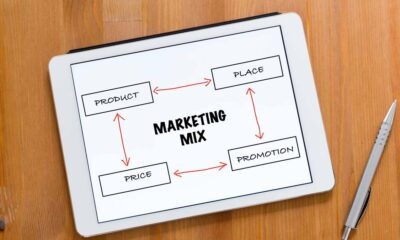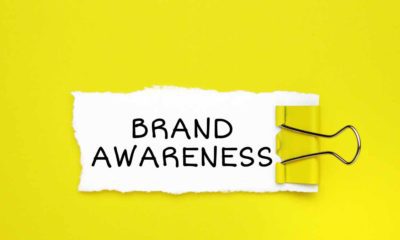Featured
What Is Digital Marketing? Your Must-Read 2023 Guide
What Is Digital Marketing?
Digital marketing refers to the process of promoting and selling products or services using digital technologies. Such as the internet, social media, mobile apps, and other digital channels. It is a broad term that encompasses a range of tactics and marketing strategies. This includes search engine optimization (SEO), content marketing, email marketing, social media marketing, pay-per-click (PPC) advertising, and more.
Why Is Digital Marketing Important?
In today’s digital age, it is essential for businesses of all sizes to have a strong online presence in order to reach and engage with their target audience. The internet has become a crucial part of everyday life for many people. And as such, it is an effective platform for businesses to reach their customers and promote their products and services.
Benefits Of Digital Marketing
One of the main benefits of digital marketing is its ability to reach a wide and diverse audience. With the internet being accessible to billions of people around the world, businesses can reach a global audience with just a few clicks of a button. This is especially important for small businesses. The reason being they may not have the resources to reach a large audience through traditional marketing methods, such as television or radio advertising.
Digital marketing is also more cost effective than traditional marketing methods. Many tactics, such as SEO and social media marketing, can be done in-house with minimal cost. PPC advertising, while it does require a budget, allows businesses to only pay for the ads that are actually clicked on. Rather than paying for the ad to be shown to a broad audience.
Another advantage of digital marketing is its ability to target specific audiences. With tools like Google Analytics and Facebook Ads, businesses can tailor their marketing efforts to specific demographics and interests. This allows businesses to create more targeted and effective campaigns. Which can lead to higher conversion rates and better return on investment (ROI).
Digital marketing is also more measurable than traditional marketing methods. With tools like Google Analytics, businesses can track the success of their campaigns in real-time. As well as see how their audience is engaging with their content. This allows businesses to make informed decisions about their marketing efforts and adjust their strategies as needed.
In addition to these benefits, digital marketing is important today because of the increasing use of mobile devices. Many people use their smartphones and tablets to browse the internet and make purchases. As a result, businesses need to have mobile-friendly websites in order to reach these customers. A mobile-friendly website not only helps businesses reach a larger audience, but it can also improve their search engine rankings and user experience.
[Read More] High Ticket Digital Marketing: What Is It & How Does It Work
Types Of Digital Marketing Strategies
There are many different types of digital marketing strategies that businesses can use to reach their target audience and promote their products or services. Some common tactics include:
- Search engine optimization (SEO): This involves optimizing a website’s content and technical aspects in order to improve its ranking in search engine results pages (SERPs). This can be achieved through keyword research, on-page optimization, and high-quality content.
- Content marketing: This involves creating and distributing valuable, relevant, and consistent content to attract and retain a clearly defined audience. The goal is to educate and inform, rather than directly promote a product or service.
- Email marketing: This involves sending targeted, personalized emails to a company’s email list in order to build relationships and drive sales.
- Social media marketing: This involves using social media platforms, such as Facebook, Twitter, and Instagram, to promote a business and engage with its audience.
- Pay-per-click (PPC) advertising: This involves placing ads on search engines or other websites and paying a fee each time someone clicks on the ad.
- Influencer marketing: This involves partnering with influencers, or individuals with a large online following, to promote a product or service.
- Affiliate marketing: This involves partnering with other businesses or individuals to promote a product or service and earning a commission for each sale.
- Video marketing: This involves creating and sharing video content, such as product demonstrations or educational videos, to promote a business.
- Mobile marketing: This involves creating and promoting mobile apps or using SMS and MMS messaging to reach and engage with customers.
Each business will have different goals and objectives. It is important to choose the right digital marketing tactics and strategies that align with those goals. It may also be beneficial to use a combination of different tactics. In an effort to reach the widest audience and achieve the best results.
What Does a Digital Marketer Do?
A digital marketer is responsible for planning and executing digital marketing campaigns to promote a product or service. This can include tasks such as creating and managing a company website, developing and implementing SEO strategies, creating and distributing email marketing campaigns, managing social media accounts, creating and placing online ads, analyzing and interpreting data, and more.
In order to be successful, a digital marketer must have a strong understanding of the latest digital marketing trends and technologies. As well as excellent communication and analytical skills. They must also be able to work well in a team and be able to adapt to the constantly changing digital landscape.
Some specific responsibilities of a digital marketer may include:
- Developing and implementing a digital marketing plan that aligns with the overall business goals and objectives.
- Creating and managing a company website, including designing the layout, writing content, and optimizing for search engines.
- Conducting keyword research and implementing SEO strategies to improve search engine rankings.
- Creating and managing social media accounts, including posting updates, interacting with followers, and analyzing social media analytics.
- Developing and executing email marketing campaigns, including creating email templates, segmenting lists, and analyzing results.
- Creating and placing online ads, including selecting target demographics, setting budgets, and analyzing results.
- Analyzing and interpreting data from various sources. Such as Google Analytics and social media analytics. To understand the effectiveness of marketing campaigns and make informed decisions about future strategies.
- Collaborating with other team members, such as designers, copywriters, and sales professionals, to create and execute successful marketing campaigns.
- Staying up-to-date on the latest digital marketing trends and technologies and adapting marketing strategies as needed.
What is a Digital Marketing Agency?
A digital marketing agency is a company that provides a range of online marketing services to help businesses reach and engage with customers through the internet. These agencies typically offer a variety of services. This entails; search engine optimization (SEO), pay-per-click (PPC) advertising, social media marketing, email marketing, content marketing, influencer marketing, mobile marketing, and video marketing.
Digital marketing agencies work with businesses of all sizes and across a wide range of industries to help them develop and execute effective digital marketing strategies. They often provide a range of services, including market research, website design and development, content creation, and analytics and reporting.
The goal of a digital marketing agency is to help businesses reach and engage with their target audience online and drive profitable customer action. By using a range of tactics and strategies, a digital marketing agency can help a business build brand awareness, generate leads, and drive sales.
[Read More] How To Create A Marketing Plan In 10 Simple Steps
Inbound Marketing vs Digital Marketing
For starters, inbound marketing and digital marketing are often used interchangeably, but they are actually two distinct concepts.
Inbound marketing is a type of marketing that focuses on attracting, engaging, and delighting customers. This is done through relevant and valuable content and experiences. It is a customer-centric approach. Its goal is to draw potential customers in. Rather than pushing marketing messages out through traditional methods like television or print advertising. Inbound marketing tactics include content marketing, social media marketing, search engine optimization (SEO), and more.
On the other hand, digital marketing is the use of digital technologies and channels to promote and sell products or services. It is a broad term that encompasses a range of tactics and strategies. This includes inbound marketing as well as tactics like pay-per-click (PPC) advertising, email marketing, and mobile marketing.
In short, inbound marketing is a subset of digital marketing. It focuses on attracting and engaging customers through content and experiences. While digital marketing encompasses a wider range of tactics and strategies. It is important for businesses to use a combination of both inbound and digital marketing tactics. This is so they reach and engage with their target audience effectively.
Bottom Line
Overall, digital marketing is essential for businesses today. It allows them to reach a wider audience, be more cost-effective, target specific audiences, and track the success of their campaigns. With the increasing use of the internet and mobile devices, it is more important than ever for businesses to have a strong online presence and utilize digital marketing strategies to stay competitive in today’s market.
Brett Heimann is a marketing & advertising professional with 10 years of experience. He's the founder of MarketingAgency.com and contributes to other publications such as; Entrepreneur, Thrive Global, and StockMarket.com. His passion for digital marketing began after graduating with a B.S.B.A in business administration and finance in 2013. After completing college, he went on to become an entrepreneur in the marketing and finance space. Brett loves the ability to deliver to his readers engaging and educational content that can be easily consumed by the reader. He enjoys writing about a wide variety of marketing topics such as; Search Engine Optimization (SEO), Paid Advertising (PPC), E-Commerce, and Lead Generation For SMBs to name a few. Brett, a South Florida native, enjoys spending time with his wife and two sons outdoors and is a big basketball and MMA fan.











